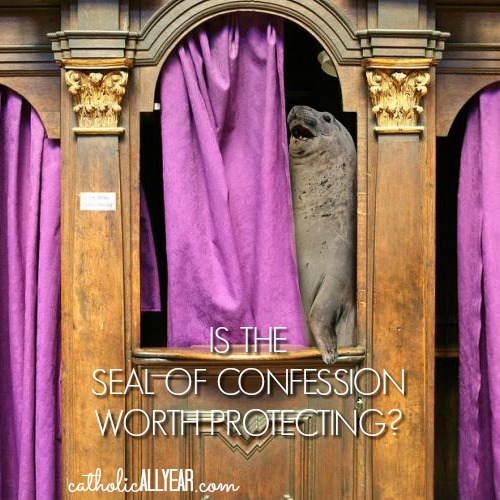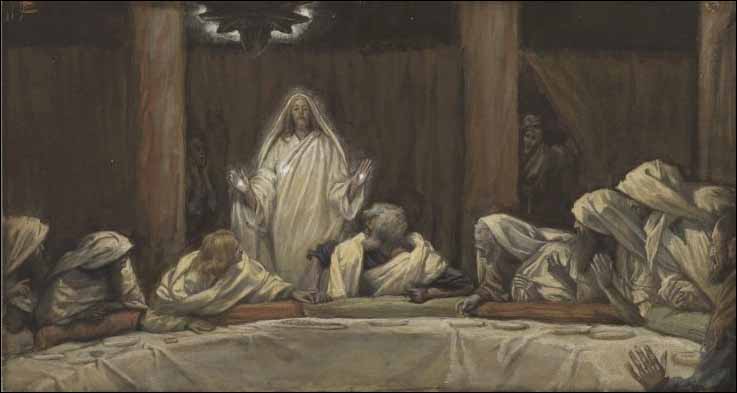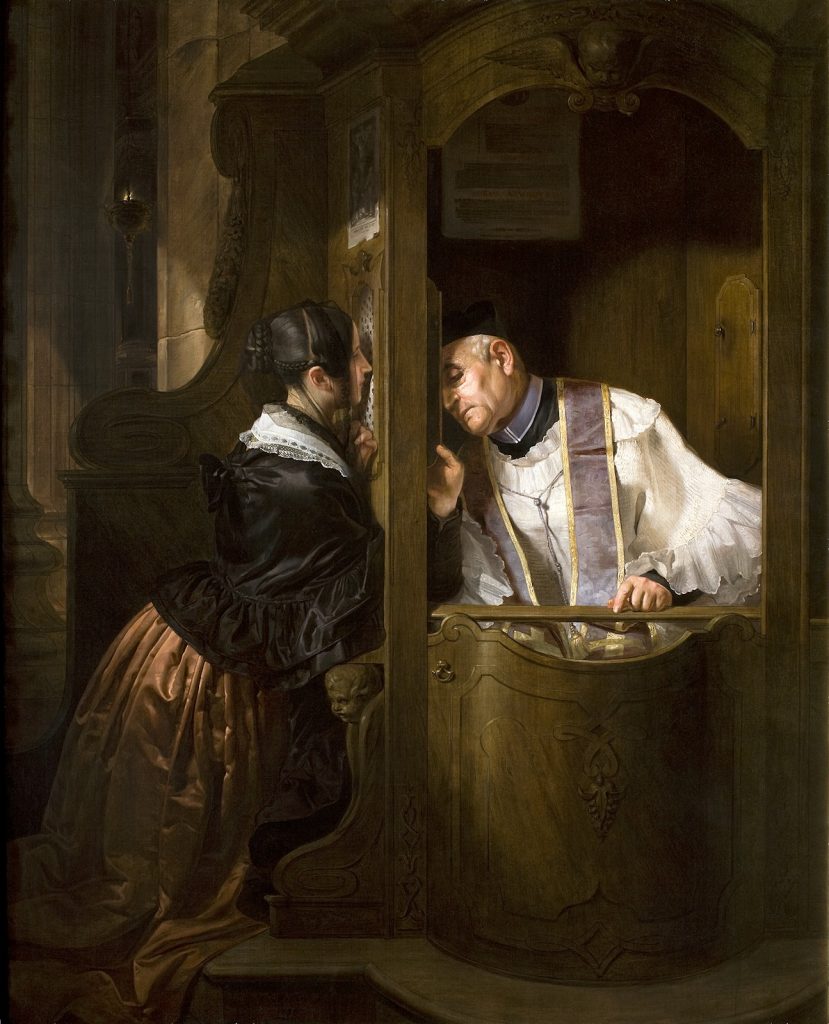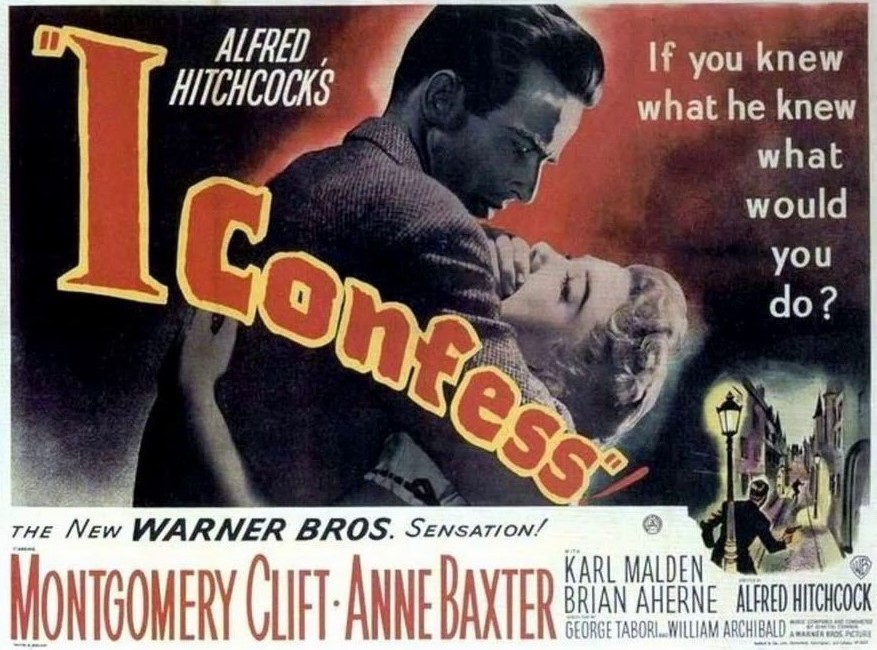The historic sanctity of the seal of confession is being reconsidered by courts around the world—in England, Ireland, Australia, Louisiana, and in my own state of California, among others—specifically in regards to the crime of child sexual abuse. It begs the question why such a thing as the seal of confession even exists, and why Catholics would be willing to defend it if it means it might protect an abuser.

While it’s a big story right now, skepticism at the idea of the Catholic seal of confession is nothing new. See this English cartoon from 1865 that reflects the fear of a Catholic revival, and its mysterious confessiony ways. Laws protecting attorney-client, doctor-patient, and minister-penitent confidentiality vary from state to state and country to country, but Catholic Canon Law is very clear. A priest may NEVER reveal something told to him in confession, ever, for any reason.
Canon 983 says:
“The sacramental seal is inviolable; therefore, it is absolutely forbidden for a confessor to betray in any way a penitent in words or in any manner and for any reason.”
The punishment is excommunication for the priest. Canon 1388 states:
“A confessor who directly violates the sacramental seal incurs a latae sententiae excommunication reserved to the Apostolic See; one who does so only indirectly is to be punished according to the gravity of the delict.”
And not just the priest is prohibited from revealing the confession. Canon 983 continues:
“The interpreter, if there is one, and all others who in any way have knowledge of sins from confession are also obliged to observe secrecy.”
And in case you wanted to “but what if” it, Canon 984 says:
“A confessor is prohibited completely from using knowledge acquired from confession to the detriment of the penitent even when any danger of revelation is excluded.”
-1983 Code of Canon Law

A priest would be excommunicated for revealing information learned in a confession regardless of local law or the wishes of the penitent himself. As Fr. William Saunders explains, a priest must not discuss information from a confession after the fact with even the penitent himself.
For instance, especially with the advent of “face-to-face confession,” I have had individuals come up to me and say, “Father, remember that problem I spoke to you about in confession?” I have to say, “Please refresh my memory” . . .
It’s easy to think, well that’s fine, but it doesn’t apply to EVERYTHING. We should be willing to make any sacrifice to protect children from abusers.
But let’s take a moment to think about what we’re giving up. Sacramental confession to priests has existed since . . . the evening of actual Easter Sunday.
Jesus said to them again, “Peace be with you. As the Father has sent me, so I send you.” And when he had said this, he breathed on them and said to them, “Receive the holy Spirit. Whose sins you forgive are forgiven them, and whose sins you retain are retained.”
-John 20:21-23 NABRE

Since the earliest written history of the Church, we find references to confession as private between priest and penitent. It’s true that through the Middle Ages penances were often public, but private confession was the norm. (See here for details.)
It’s not as if people’s sins have just recently become horrible/illegal/things we’d like to prevent. So we either believe in confession as a sacrament, as Jesus gave it to us, or we don’t.
The reason we are willing to accept the seal of confession even in the face of horrible crimes is because we believe that an even greater tragedy than a horrible crime, is a soul lost forever to hell. A confession with genuine contrition reconciles a person to God. I really think these laws are largely a veiled attack on religious freedom. But they’re also a not at all veiled vote for just damning abusers to hell for all eternity. And, as horrible as is their crime, we can’t want that. God wants their repentance and redemption. In charity, we have to want that too.
Now, one assumes that a person with genuine contrition would also want to try to make things right with the people he hurt, and even with society by turning himself in to the local authorities and taking his punishment. We hope that a good priest would give him that advice, and help him get the help he needs, or even make his absolution contingent on it. (Oops. Turns out that’s not possible, see the comments.) But the goal of sacramental confession is to reconcile the sinner to God.
We, as Catholics, must recognize the importance of defending the legal right of each and every person to seek reconciliation with God in a private sacramental confession. As reprehensible as are people who commit grievous sins that hurt other people, and I’m willing to go so far as to say that child sexual abusers are the worst of the worst, we can’t let our horror blind us to what’s really at stake here.

Yes, the Catholic Church failed again and again in her responsibility to protect her most vulnerable members from predators, and even more shamefully from the wolves among the shepherds themselves. We are suffering the repercussions of those shameful acts in our loss of credibility in public opinion.
But we cannot just accept that as a reason to sacrifice our hard-earned religious freedoms.
It’s clear that good and faithful priests will not choose to incur excommunication by violating the seal of confession, therefore they could find themselves facing jail time. I don’t believe that the actual effect of these laws would be to protect children, nor do I think that’s the intent. I think the intent is to restrict religious freedom and to persecute good priests as a punishment for the failures of other members of the Catholic Church. As much as child sexual abuse feels like it’s worth sacrificing anything to prevent, these laws won’t actually prevent it, and will certainly result in further encroachment on the sacrament of confession in particular, and religious liberty in general.
It seems worth noting that the use of a confessional screen makes all of this rather a moot point for priests who might face imprisonment for refusing to violate the seal of confession. So I’m going to suggest we penitents go ahead and do that.
Further Reading . . .
This article is an interesting look at the legal side of the issue:
Louisiana May Jail A Catholic Priest For Refusing To Break The Seal Of Confession
And the (partial) resolution of that case:
Judge dismisses Baton Rouge Catholic Diocese, priest from lawsuit involving the confessional
Here’s an article that includes a look at a few of the particular cases around the world:
Laws Forcing a Breach in the Confessional Seal Are in No One’s Best Interest
A priest’s perspective on whether a priest can ever violate the seal of confession:
A very thorough look at the history of confession, particularly whether it has always been private between priest and penitent:
A history of the use of the sacrament of reconciliation in the early Church
And Watching . . .



I had vaguely understood that confessing outside of confession could not be a condition of absolution because that would acknowledge something that took place inside the confessional. Does that make sense? It would be such a great solution if that’s not the case! Thanks for this.
Interesting. I could see that.
Yes, my brother mentioned this on the air the other day too. A priest may *strongly* encourage a penitent to confess to authorities but he may not make it a condition of absolution because that thereby makes his absolution conditional upon public revelation of a sin. He explained it better than that, though. Haha. I’ll see if I can find the episode.
Here’s a link to the episode. It begins about halfway through the 48 minutes, more or less.
https://podcasts.apple.com/us/podcast/st-josephs-workshop-with-fr-matthew-spencer/id1145026263?i=1000439103683
It’s my non-expert reading of Canon 982 that priests may not absolve someone who confesses to falsely denouncing a confessor until they’ve renounced their false denunciation. I think a version of Canon 982 for withholding absolution in cases of child abuse and other ongoing crimes until the penitent takes steps toward amendment, including surrendering themselves to the authorities, would be very reasonable.
Can. 982 Whoever confesses to have denounced falsely an innocent confessor to ecclesiastical authority concerning the crime of solicitation to sin against the sixth commandment of the Decalogue is not to be absolved unless the person has first formally retracted the false denunciation and is prepared to repair damages if there are any.
Thanks so much for the detailed explanation- like you say a lot of this can be circumvented by the use of screens. In the UK and Ireland (where I am) it is the norm that screens be used, and generally you are in a separate room, entering by a different door, to protect privacy. Face to face confession tends to be for large reconciliation services or because of an individual relationship with the priest.
Why in the world would they have a rule in place for the false accuser, but not for the abuser? If the person above my comment is correct with can. 982, they could easily add that there will be no absolution for a child abuser until they turn themselves in to authorities. Period.
I just feel that this is practically a moot point. A law demanding that priests turn in abusers who confess would be yet another law that makes authorities/the public feel like they have done something but accomplishes nothing in reality. One of the problems with these types of crimes, I’ve heard, is that people who commit them are so depraved or so psychologically disturbed that they are very unlikely to even see what they are doing as horrifically evil — and therefore unlikely to seek absolution. It just seems like an incredibly unlikely scenario all the way around, and this kind of law would be mere virtue-signaling while also attacking the Church.
I agree. It is an attack on religious liberties that would have little to no practical legal effect.
Abusers would stop going to confession, if they were going to begin with.
The real risk of putting limits on the seal of confession is the tragic consequences for the eternal souls of people no longer willing to participate in the sacrament.
In addition confession is meant to lead to a conversion of behavior. This opportunity for counsel and conversion is lost if people lose their trust in the seal of the confessional.
It seems to me an attempt to punish the Catholic Church and is a blatant violation of the first amendment.
Canon 982 is about a specific sin that also incurs latae sententiae (automatic) excommunication: a priest absolving someone with whom he has sinned against the 6th commandment. I don’t think we can generalize our interpretation of this problem based on that canon. The church has to be especially careful with latae sententiae crimes because that penalty can only be lifted by a bishop, or sometimes the Pope. 982 is about a person who has gotten a priest excommunicated by telling a lie about the sacrament of penance itself, and I think that’s the only reason the absolution is conditional.
I agree that Canon 982 is about a specific sin, but I think it should make us think about whether conditions for absolution are appropriate in other grave situations. The sin 982 addresses isn’t more serious than the sin of sexual abuse. (And laetae sententiae excommunication occurs when the act is committed, so if the act wasn’t committed, the excommunication didn’t actually occur– so 982 isn’t necessary to restore an innocent priest to actual communion with the Church.) Anyway, I’m not at all suggesting that the California law is justified– I just think canon law could be stricter about absolution in cases of grave ongoing sin, and that that would both be better and look better for us (the Church) especially when we find ourselves in arguments with the State like this.
I also find it strange that a confessor himself cannot seek legal restitution as part of the absolution process because of a need for confessional secrecy. I completely understand the need for complete privacy and confidentiality, but Isaiah 1:16-18 makes it clear that stopping the sin is not enough to be made clean. The Lord requires the sinner to seek justice and fully redress the wrong.
Doesn’t seeking justice and restitution include accepting legal punishment for a crime committed? A priest should not be responsible to “tattle” (and yes, yes, yes – another impingement on religious freedom to take this issue to the courts!) – but the confessor should need to take the responsibility for a civic confession and subsequent legal action at the advice of a priest. Otherwise, how can “justice be the aim” truly, or how can full restitution to the victim possibly be made? And doesn’t that requirement of repentance trump a statue of privacy if a legal confession is left to the agency of the confessor as condition of full repentance?
The sin in canon 982 most certainly is far more serious than abuse. It’s sacrilege. It is a gross violation of the sanctity of the priesthood for a priest to commit sexual sin. It is even more outrageous if he should entice another person to be his partner in sexual sin by promising absolution after the fact (first and foremost because it encourages sacrilegious Confessions, as absolution is invalid without genuine contrition and firm purpose of amendment). Therefore, unless the accomplice is in imminent danger of death, a priest is forbidden under pain of excommunication to absolve an accomplice in sexual sin. In imminent danger of death, all canonical restrictions are removed for the sake of enabling the penitent to die in God’s grace.
P.S. Thank you Kendra, for helping us keep the right perspective on this issue.
Thank you for standing firm in explaining the Catholic position on the confessional. As a Lutheran, I appreciate this, because the Lutheran position is very similar…not quite as binding for the pastor as Canon Law with a penalty of excommunication, but basically the pastor is expected to hold all things heard in confession as Christ’s property and not his own, and therefore cannot reveal them, despite political law to the contrary.
Yes, thank you. That’s an excellent point. There are many Protestant denominations with similar regard for the importance of privacy of confession.
This is a very serious post about a very serious and important issue. But I had to pop in and say that graphic. I need a Seal of Confession now. I think it needs to be a thing.
I totally agree, but I have to admit, I was a tiny bit disappointed that no one had commented on it before. I was SO EXCITED when I made it. Hah! So, thanks. 🙂
Just caught the SEAL in the confessional!!!! I was just so anxious to read the article I blew right past it. It also blends in a lot.
Thank you so much for writing on this topic. I live in California too but I have found myself struggling for words when it comes to my innate understanding that we should defend the sanctity of the Sacraments. This article was really helpful in putting all my thoughts in one place! I think it will be easier to discuss with those who don’t hold the same view now. Thank you so much for it!